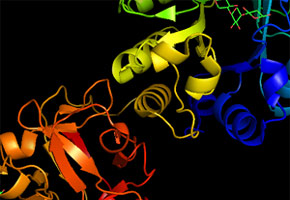

In a FAPESP-funded project, a company intends to develop technology for large-scale production of specialized enzymes
In a FAPESP-funded project, a company intends to develop technology for large-scale production of specialized enzymes.
In a FAPESP-funded project, a company intends to develop technology for large-scale production of specialized enzymes.

In a FAPESP-funded project, a company intends to develop technology for large-scale production of specialized enzymes
By Flora Serra
Agência FAPESP – Enzymes are among the most remarkable biomolecules. They are proteins that possess catalytic properties to accelerate chemical reactions that occur inside and outside of organisms. Enzymes have been used extensively, including by the pharmaceutical industry, to increase the efficiency of processes or reduce the costs and environmental impacts of some chemical compounds.
Xylanase is an enzyme that is usually used during industrial wood processing to whiten the cellulose. Verdartis Desenvolvimento Biotecnológico, located on the Universidade de São Paulo (USP) Ribeirão Preto campus (upstate São Paulo), is developing a protein engineering system that optimizes the production of specific enzymes such as xylanase.
The research project titled “Bioprocesso de produção de enzimas para biorrefinaria de biomassa: branqueamento de celulose” [Bioprocess of the production of enzymes for biomass biorefinery: cellulose whitening] was approved in the PAPPE-PIPE III 2011 call for proposals released by FAPESP, together with the Brazilian Innovation Agency (FINEP). Today, the goal is to develop technology for large-scale production of enzymes that are specialized in the catalysis of certain processes.
“We have already produced enzymes efficiently, but we still need to make some technological changes to be able to produce on an industrial level,” said Verdartis partner Marcos Lorenzoni to Agência FAPESP.
Richard John Ward, professor in the USP Riberão Claro Chemistry Department, helped with the technology transfer from the laboratory to Verdartis headquarters, where he is a consultant. “Aside from the experimental stage of molecular biology, the project aggregates production, bioprocessing, and bioinformatics,” said Lorenzoni.
To reach an industrial production scale, the amount of enzymes produced must be significantly increased to warrant the use of a reactor that, consequently, will reduce the production cost.
“Today, we make xylanase in a 10-liter fermenter, and we reduced the cost of bench-scale production by 80 times when we transferred the technology from the laboratory to the company, considering only the cultivation medium,” explained Álvaro de Baptista Neto, the Verdartis researcher responsible for the project.
Lorenzoni says that the first significant reduction in the production cost can be attributed to the use of Artizima software for the selection of the enzymes that are best suited to the cellulose whitening process. The software was developed with support from the FAPESP Innovative Research in Small Companies Program (PIPE).
According to Baptista, if it were not for the software, the selection of the best enzymes would have to be made by visual inspection. “Before the robots, we used to take about two years to produce specific enzymes. Now, that time has been reduced to eight or even six months,” he said.
Artizima manages the selection of enzymes that, in the case of cellulose whitening, need to perform optimally at high temperatures and in varying levels of acidity (pH)—the two main variables of the process.
“Based on a guided evolution procedure, Artizima performs randomly assigned mutations of the enzymes, simulates the molecular dynamics at different temperatures and pH levels and finally selects the best enzymes,” explained Lorenzoni.
Guided evolution
Lorenzoni says that Verdartis seeks to develop enzymes according to the actual pH and temperature conditions presented by manufacturing facilities such as Suzano Papel e Celulose, a collaborator of the company.
“The guided evolution allows for continued improvement in the efficiency of these enzymes. For example, in only four evolutions, a xylanase that functions property at 55°C can now respond in a temperature as high as 90°C,” he explained.
“With a 15-computer cluster [also acquired through FAPESP funding], we took only one month to determine the most efficient mutation of enzymes that specialize in the cellulose whitening process,” affirmed Lorenzoni.
“The software and the robots are tools that, aside from helping us in the search for enzyme clones, increase the possibility that these clones will be more specialized, properly prepared and important for the process,” added Baptista.
The entire procedure that was developed by Verdartis already significantly reduces the processing time and costs; however, it is still necessary to adjust it for large-scale production—the primary objective of the project approved by PAPPE-PIPE III.
The company, founded in 2007, intends to patent the enzyme production process based on guided, accelerated evolution. “Verdartis was created not only to produce enzymes, but also to develop technologies that facilitate the synthesis of industrial enzymes,” said Lorenzoni.
“We already have results from fermenters that produce up to 10 liters of enzymes. Now we want to expand to a 50-, 100-, and 500-liter scale. If we succeed, we will have a good chance to be competitive on the enzyme production market,” said Baptista.
Republish
The Agency FAPESP licenses news via Creative Commons (CC-BY-NC-ND) so that they can be republished free of charge and in a simple way by other digital or printed vehicles. Agência FAPESP must be credited as the source of the content being republished and the name of the reporter (if any) must be attributed. Using the HMTL button below allows compliance with these rules, detailed in Digital Republishing Policy FAPESP.





